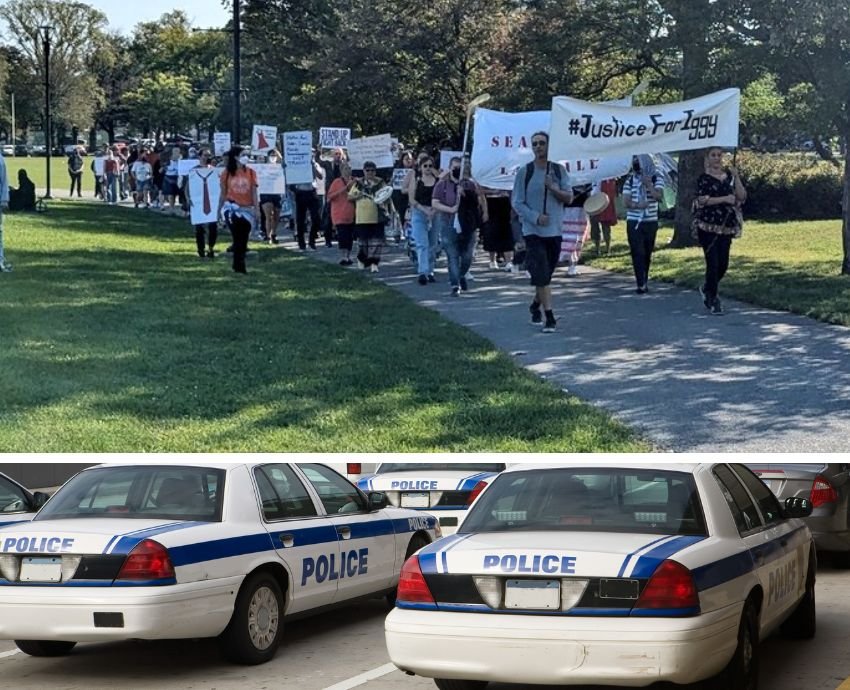
Police killed six First Nations people in just 11 days across Canada, sparking outrage towards the Royal Canadian Mounted Police (RCMP) and the violence it disproportionately inflicts on First Nations communities. Renewed mobilisations have called for social transformation away from policing and towards community health and wellbeing.
Saskatchewan RCMP struck and killed 31-year-old Clearwater River Dene Nation man Jack Charles Piche with their vehicle, while he was walking along the road on the night of August 29.
RMCP in Wetaskiwin, Alberta, responded to an emergency call on August 30 from Hoss Lightning, a 15-year-old from the Samson Cree Nation, who said that people were following him and trying to kill him. Police found Lightning allegedly in possession of weapons, which officers confiscated, before shooting him dead. The community has questioned why Lightning was killed despite turning over the alleged weapons.
Winnipeg police struck and killed Tammy Bateman, an unhoused Roseau River First Nation woman, with their car near the city’s Fort Rouge Park encampment on September 2. Community members have raised questions about why police were driving at night on a walking path leading to the encampment, suggesting the lack of regard that police have for unhoused people in the city.
Police shot dead 57-year-old First Nations man Jason West in Windsor, Ontario, on September 6. West was precariously housed and well-known among unhoused people and downtown shelter residents in the city.
New Brunswick RCMP tasered and shot dead 34-year-old Mi’kmaw man Steven Dedam on September 8, after officers were sent to his house in response to Dedam threatening to harm himself. Dedam was not described as being a threat to anyone else at the time of the call.
RCMP shot dead Ahtahkakoop Cree Nation man Danny Knife on September 8. While few details have been released, police had confronted Knife outside a home in northern Saskatchewan before shooting him.
A seventh victim — 42-year-old Kanai Nation man Jon Wells died in police custody, soon after being tasered, pepper-sprayed and arrested at a southeast Calgary hotel on September 17. Police claim he was in the front lobby “acting erratically and not cooperating with officers”, which community members have rejected as a reason to brutalise and kill someone.
Colonial forces
First Nations people are disproportionately the victims of lethal police force in Canada. A 2020 analysis showed that between 2017–20, a First Nations person in Canada was more than 10 times more likely to be shot and killed by police than a white person. Twenty-five of the 66 people killed by police in this period, in which race or heritage were identified, were First Nations.
This disparity is also shown in overall data for police killings in Canada. The Canadian Civil Liberties Association recently reported that while First Nations people make up 5.1% of people living in Canada, they represent 16.2% of people killed by police.
Meanwhile, the agencies responsible for investigating police killings provide little oversight or accountability. A Canadian Press review found that 111 of the 167 members working in police oversight agencies were former police officers, and that most were white men. These agencies uphold colonialism and white supremacy, while giving the illusion of oversight.
Between 2000–17, less than 4% of the 704 police killings resulted in charges. Out of the 18 charges laid, only two resulted in convictions.
A 2020 report found that in only 3–9% of the cases undertaken by the provincial oversight agencies were charges laid or the case forwarded to Crown prosecutors for consideration.
Abolish
The latest police killings are a poignant and heinous reminder of the colonial nature of policing in Canada and the ongoing genocide of First Nations people. Police forces were created and empowered to kill in the service of producing, maintaining and expanding structures and relations of colonial dispossession and domination, capitalist labour markets and class exploitation and repression of resistance.
This is most clearly represented in the colonial RCMP, which was created as a military force of invasion and occupation tasked with clearing western Canada of First Nations people.
This is why we cannot turn to the state when seeking oversight, accountability or justice. Police have killed with impunity, in even greater numbers, despite the growth of oversight agencies, inquest recommendations or ‘reforms’ (like body cameras, for example).
As abolitionist movements have stressed for a long time, fulfilling communities’ needs for accountability and justice means defunding, disarming and dismantling the police.
But the state will not disarm itself. Dismantling current policing structures and ending police violence means ending the capitalist systems that gave rise to modern policing in the first place.